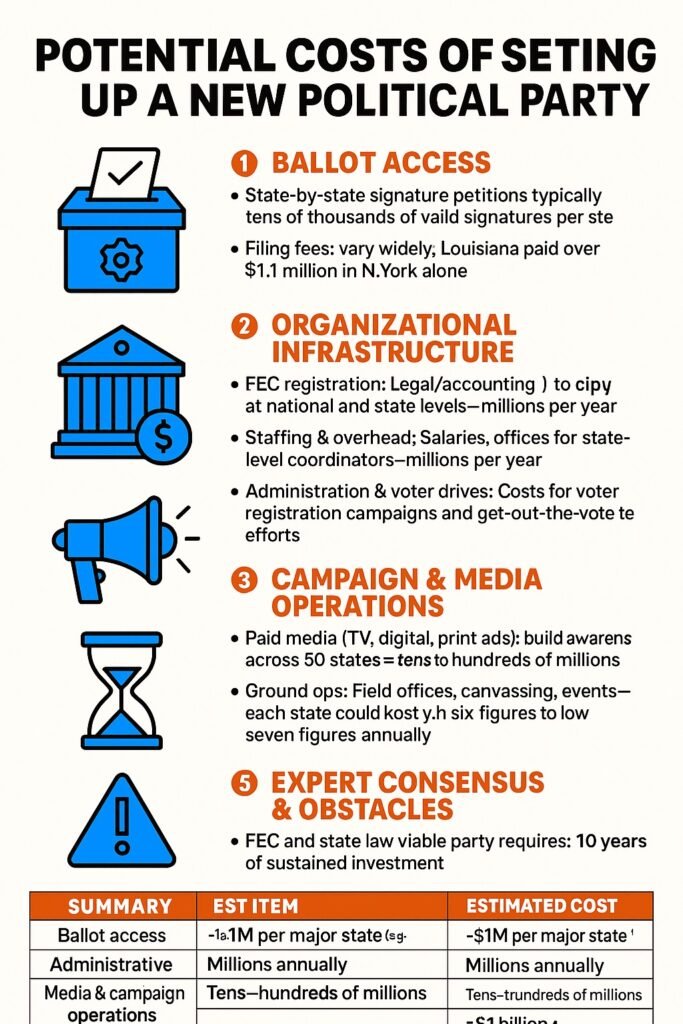TL;DR:Elon Musk is launching the America Party—a new political force aimed at shaking up the two-party system. This move comes after a sharp fallout with Donald Trump over a tax-and-spending bill Musk has labeled a “disgusting abomination.” Critics say the party is rooted more in revenge than reform, and it risks fracturing right-wing support while failing to establish real political traction.
Musk vs. Trump: Fallout Over Fiscal Policy
The billionaire who once cozied up to Trump has flipped. After reportedly contributing over $250 million to the Trump 2024 campaign and pushing for roles in the administration, Musk turned on the GOP after Trump’s latest bill—full of tax breaks for the wealthy and cuts to social safety nets—was passed.
Musk lambasted the bill as “debt slavery” and “a disgusting abomination,” warning it would balloon the federal deficit by over $3 trillion in a decade, a claim echoed by the nonpartisan Congressional Budget Office.
His response? Announce a new political party on X (formerly Twitter), declaring:
“We live in a one-party system, not a democracy. The America Party is formed to give you back your freedom.”
Is the ‘America Party’ a Real Political Force or a Vanity Project?
While Musk has floated the idea of focusing on swing Senate and House races to act as a legislative kingmaker, critics argue the entire move reeks of political inexperience and ego-driven retaliation.
Even conservative commentators, such as the Black Conservative Perspective, say it outright:
“This isn’t about ideology. It’s about revenge. If it were really about fiscal restraint, Musk would be backing the Libertarian Party.”
Musk himself once tweeted:
“By the way, I am actually a socialist—just not the kind that shifts resources from most productive to least productive.”
It’s this ideological ambiguity that makes political observers question who, exactly, Musk’s America Party will appeal to. MAGA? Unlikely. Progressives? Probably not. Moderate centrists and techno-libertarians? Possibly.
Early Endorsements Raise Eyebrows
Notable endorsements for the America Party include:
- Mark Cuban, who publicly offered help getting the party on all 50 state ballots.
- Anthony Scaramucci, a former Trump aide turned critic.
- Scott Adams, who speculated Musk won’t even field a presidential candidate.
These are not Trump loyalists. In fact, they more closely represent a centrist-never-Trump bloc, complicating Musk’s positioning in an already polarized landscape.
The Ross Perot Comparison: Déjà Vu or Delusion?
Political veterans recall Ross Perot’s 1992 and 1996 Reform Party runs that helped hand the White House to Democrats. Critics warn Musk may be repeating that playbook—splitting the conservative vote and giving Democrats a path to win in 2026 and 2028.
As one analyst noted:
“This has none of the populism of Perot. Musk is not the outsider Americans rally behind—he’s a Silicon Valley billionaire born in South Africa trying to buy influence. That’s not populism. That’s plutocracy.”
A Losing Game in a Winner-Take-All System
America’s first-past-the-post voting system heavily favors a two-party structure. Without structural reforms like ranked-choice voting, third parties often act as spoilers, not winners. Political scientist Christian Whiton bluntly summarized:
“We already have a Libertarian and Green Party. They don’t work. Money won’t fix that. Relationships do—and Musk doesn’t know how to play that game.”
The Real Stakes: Business, Not Ballots
Musk’s companies—Tesla, SpaceX, Starlink—depend on government contracts and favorable regulation. Picking fights with both Republicans and Democrats is risky.
Some investors already fear political overreach could lead to regulatory backlash, especially if Democrats regain control of the House or Senate in 2026.
Final Thoughts: Power Play or Political Suicide?
Musk’s ultimate goal may not be ideology, but influence. His techno-libertarian vision of America—fiscally conservative, clean-energy focused, anti-bureaucratic—has no clear home in today’s party system. But forming a party out of revenge, without groundwork, patience, or political savvy, risks blowing up in his face.
As one commentator warned:
“You can’t openly buy politicians. You can’t be the face of everything and not expect backlash. Musk needs to learn how power works before it destroys what he’s built.”


